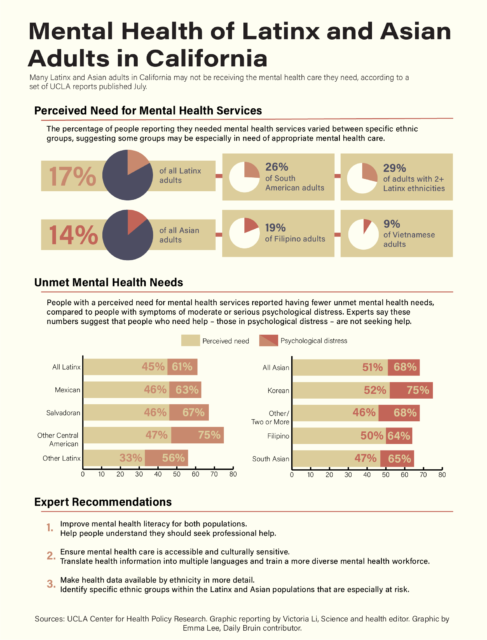This post was updated Sept. 8 at 9:30 p.m.
A recent pair of studies conducted by UCLA researchers found the mental health needs of the Latinx ethnic groups and Asian ethnic groups in California are not being met.
The studies, published July 22, broke down the Latinx and Asian populations in California into respective ethnic groups to analyze their mental health needs using California Health Interview Survey data from 2015 to 2019.
The studies used two measures for expressing mental health needs, one being self-reported need and the other being symptoms of psychological distress, said Imelda Padilla-Frausto, one of the authors of the studies and a research scientist at the UCLA Center for Health Policy Research.
According to the policy brief for the study on Asian ethnic groups, 68% of Asian adults with symptoms of serious or moderate psychological distress experienced unmet mental health care needs. When examining specific Asian ethnic groups, however, the percentage varied from 45% for Japanese adults to 78% for Vietnamese adults.
Similarly, the policy brief for the study on Latinx ethnic groups found that 61% of Latinx adults in serious or moderate psychological distress experienced unmet mental health needs, but that percentage dropped to 52% for South American adults and rose as high as 75% for non-Salvadoran Central American adults.
Both Latinx and Asian adults were also more likely to report experiencing symptoms of psychological distress than to report feeling like they need mental health care, according to the studies.
The issue is that people are feeling distressed and are reporting symptoms of distress, but they are not connecting it to needing professional help, Padilla-Frausto said, adding that it is analogous to going undiagnosed with other medical conditions, such as diabetes.
“People may be walking around with symptoms of diabetes, but unless they’re screened or they’ve seen a doctor or their symptoms are causing them a lot of issues, they’re not going to get the care that they need because they don’t know that they are walking around with diabetes,” she said.
Several factors can contribute to the variation between ethnic groups, including immigration experience, politics in one’s home country and how people are treated in the U.S., said Padilla-Frausto, who is also a commissioner for the Los Angeles County Mental Health Commission.
“We really felt it was important to look at those groups separately because a lot of times in research, they are put together as one homogenous group,” she said.
Another recommendation was to remove barriers to accessing mental health care by offering services in different languages and improving the ethnic and cultural diversity of providers available, said Susan Babey, another author of the studies and a senior research scientist at the UCLA Center for Health Policy Research.
Using culturally sensitive and linguistically appropriate materials can help people who might have limited English proficiency and improve their mental health literacy, she added.
One of the primary reasons these needs are unmet is a lack of diversity in the mental health workforce, said Luis Guzman, a clinical psychologist for the Los Angeles County Department of Mental Health.
“There is a shortage of bilingual, bicultural clinicians,” Guzman added. “That includes psychologists that are able to provide culturally responsive, culturally appropriate services based on the overall population.”
Disaggregating the data into subgroups within the Latinx and Asian ethnicities helps providers understand the needs of each individual group and best tailor services and develop a greater understanding of mental health needs, said Héctor Manuel Ramirez, who reviewed the policy briefs and has also been a consumer of the LACDMH’s services.
“One of the things that we have seen in our community, and similarly the AAPI communities, is the lack of singularity or granularity,” said Ramirez, who also serves on Gov. Gavin Newsom’s Behavioral Health Task Force.
Placing everyone under one single umbrella instead drives more disparities because it does not account for the importance of cultural competence or cultural proficiency, they said.
Another factor driving the trends in the studies is cultural stigma around mental health and not recognizing they should seek help, said Carmen Perez, a project manager of mental health and social services integration at Adventist Health White Memorial hospital.
In Asian and Latinx communities, there is a negative connotation associated with mental health, Perez said.
“It hasn’t really been identified as physical health, which it is,” said Perez, who is also the co-founder and co-chair of the Latino(x) Mental Health Advocacy Concilio.
Perez said there is also a need to address the workforce shortage.
“We don’t have enough mental health care providers, especially (those who are) bilingual (or) bicultural,” she added. “We really have to figure out a way to provide more resources by providing more grants to people who want to go to mental health (professions) and provide more funding for graduate programs.”
Padilla-Frausto said she hopes the studies will influence future projects to collect more comprehensive data on ethnic groups. Looking at the individual ethnic groups would help inform better services and better outreach and ensure better data is being collected, she added.
“From a policy and service provider perspective, I think I would hope that this would influence decision-makers to really work with these ethnic communities to develop better services that are more meaningful, more attainable (and) more reachable to these populations,” Padilla-Frausto said.

